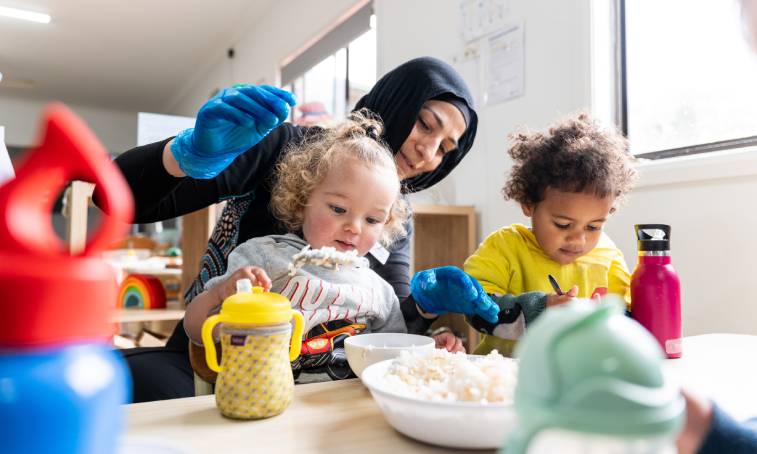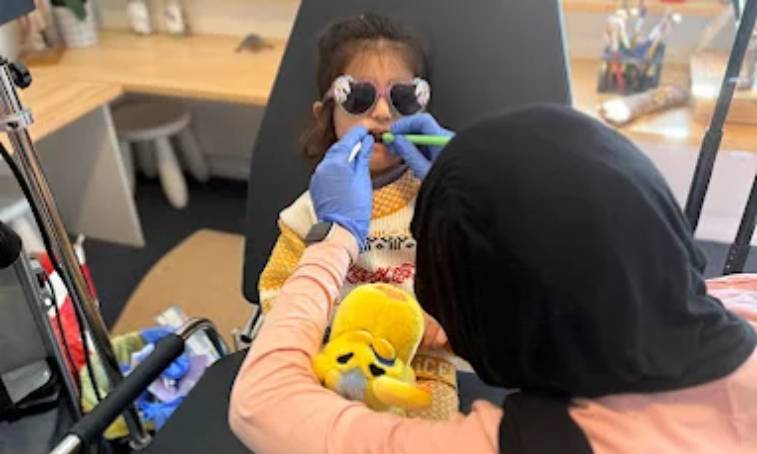Ever watched your child shrink back when others step forward? It’s like seeing their confidence slip through your fingers.
When children feel deeply, even small moments can feel overwhelming, fuelling self-doubt instead of self-worth.
Every kind word, glance, or challenge lingers longer in a sensitive child’s world, shaping how they see themselves. Parents often wonder how to build confidence in a sensitive child, wanting to cheer them on, yet second-guessing what truly helps and what might hurt.
At Next Generation Kindergarten, we support families who want more than just care; they want understanding.
We help sensitive hearts grow strong through patient guidance, creative play, and warm, consistent support each day.
Understanding Sensitivity in Children
A sensitive child often feels the world a bit louder, brighter, and deeper than others. These children pick up on tone changes, emotional cues, and shifts in environments with astonishing speed.
Supporting them begins with understanding how their emotional radar works and what they most need to feel safe and supported.
Recognising the traits of emotionally sensitive children
Many children show signs of emotional sensitivity, but some feel things just a little more deeply. They may startle easily, cry unexpectedly, or seem overwhelmed by loud noises or social pressure.
Spotting emotional intelligence early, such as curiosity about others’ feelings or responding with empathy, is key to understanding a child’s emotional world.
Understanding the link between sensitivity and low confidence
Sometimes children who feel things strongly can lose belief in themselves after a stumble. They replay that moment, and it becomes larger than life.
Building confidence begins with allowing mistakes while showing that self-worth never changes – even when things go wrong.
The role of temperament and environment
Every child comes wired differently, but the care we give them can shape how secure they feel. At Next Generation Kindergarten, we create calm, structured spaces that support emotional growth.
A consistent, loving environment can soften a whirlwind temperament and support everyday challenges with more confidence.
The Foundations of Confidence in Sensitive Children
Helping a sensitive child discover their voice starts with small experiences of achievement. From those moments, self-worth begins to grow.
We reinforce their emerging confidence by making sure every win counts, whether big or small.
How confidence develops in early years
In the first five years, every smile returned and phrase repeated helps confidence grow. Children need to try, fail, and try again, all with someone steady by their side.
Through hands-on play and plenty of open-ended time, they learn their thoughts and actions matter.
Impact of self-esteem and self-image
Children begin to see themselves as capable when their successes are noticed thoughtfully. When children trust in their worth, they participate more and step up with courage.
We often encourage gentle reflection, as this helps form a positive self-image grounded in curiosity, rather than fear.
Encouraging a growth mindset
Trying without the fear of failing changes how kids see challenges. We embed this thinking into everyday learning by showing that mistakes are just steps in learning.
Through consistent encouragement, they learn to say: “I can try” – instead of “I can’t.”
Practical Confidence-Building Strategies
A sensitive child doesn’t need grand victories; they need repeated, manageable moments that help them feel strong from the inside out.
As educators and caregivers, the way we respond matters more than what we ask of them. That’s why learning how to build confidence in a sensitive child starts with patience, encouragement, and creating safe spaces where they can grow at their own pace.
Focused, effort-based praise
We make praise meaningful by linking it to effort, not outcome. Saying “You worked so hard to figure that out” matters more than “You’re so smart.”
This shows children we value their process and helps replace hesitation with pride in trying.
Teaching resilience through mistakes
We help children see mistakes as part of learning by guiding them through, not around, challenges.
Using calm discussion, we break down what happened and turn setbacks into stories of persistence – not failure.
Developing problem-solving and decision-making skills
Small choices throughout the day – choosing materials, deciding where to play – give children practice in thinking for themselves.
This fuels confidence and builds internal cues that say, “I can figure things out.”
Supportive Parenting Techniques

No one knows a child’s heart like their parent. The words you say and the tone you choose shape how your child sees themselves.
Our programs work best when caregivers and educators walk together, using consistent strategies that support emotional well-being.
Emotion coaching and empathetic communication
At Next Generation Kindergarten, we use emotion coaching to reflect feelings rather than silence them. “You sound frustrated” opens up trust.
Children who feel seen are more likely to keep trying even when things feel hard.
Providing structure with room for autonomy
Clear expectations paired with space to explore build confidence safely. Children thrive in environments that respect routines but offer freedom to make choices.
This balance lets them feel capable and trusted without feeling lost.
Using scripts to redirect negative self-talk
We help children reframe discouraging thoughts with simple, empowering phrases. From “I can’t do this” to “I’m learning how,” they slowly internalise healthier narratives.
It’s about repetition, warmth, and lots of encouragement in tough moments.
Creating an Encouraging Home Environment
What happens at home echoes throughout the day. Creating a space filled with encouragement rather than pressure builds a child’s inner strength.
Home doesn’t need to be perfect – just predictable and filled with understanding.
Encouragement over perfection
Try replacing “Be careful” with “You’ve got this” to help cultivate bravery. When children know they won’t be expected to do it perfectly, they tend to try more.
Courage begins where pressure ends.
Shared activities that build social confidence
Playgroups, park chats, and family games help children practice starting conversations and sharing with others.
Even quiet children benefit from laughs around the table or hand-holding on a group walk.
Using play, art, and expression-based methods
Creative spaces give children language when words fail. We offer painting, dramatic play, and drawing to help release big feelings.
It’s a space where no answer is wrong – just an expression of what’s important to them.
Navigating School and Social Settings
New places, faces, and routines bring both excitement and nerves for sensitive children. School settings thrive when there is thoughtful communication between educators and parents.
At Next Generation Kindergarten, we work closely with families to support smooth transitions and confidence in daily routines.
Collaborating with teachers and school staff
Sharing your child’s emotional patterns with educators can unlock better support. We regularly update parents, use shared strategies, and offer familiar cues to help children manage their day.
Children flourish when voices at home and at school speak in harmony.
Preparing for transitions and new experiences
We prepare sensitive children for change in small ways – practising short goodbyes or visiting the new space together.
We offer extra time and add familiar routines to new settings to ease the adjustment.
Guiding conflict and peer challenges
Instead of avoiding conflict, we coach children gently through it with scripts and emotion labels. “You wanted a turn, and that made you sad” helps them identify and name their feelings.
Over time, they begin to handle tricky moments without fear.
External Support and Therapy Options
Sometimes, deeper emotional layers need more support. Professional help can be a helpful bridge that renews family calm and strengthens the child’s sense of self.
We recommend support when consistent worry, anger, or withdrawal starts to impact everyday joy.
When to seek professional support
If your child avoids everyday situations or expresses ongoing fear, outside help may offer new tools. Early support is always stronger than waiting for struggles to grow.
Therapists can offer relief through understanding and structured techniques designed for young children.
Types of therapy approaches that support confidence
Play therapy and art therapy support young children without demanding adult-style conversations. Expression becomes the path to healing.
Therapists trained in emotional development work alongside families to increase peace and emotional clarity.
Workshops and programs to build self-esteem
Local resilience workshops and peer support groups can gently grow confidence. These safe group settings mimic everyday experiences through supported play or guided storytelling.
Seeing others try builds courage naturally.
Additional Resources and Activities
Confidence grows outside classrooms, too. Simple routines and active experiences can nudge children toward braver steps.
Here are activities we use regularly at Next Generation Kindergarten to invite confidence in everyday moments.
Mindfulness and breathing exercises
We offer belly breathing during transitions or before rest time. Teaching children how to calm their bodies gives them control when emotions rise.
These techniques are simple enough for small ears and powerful enough to bring peace.
Role-playing and confidence games
Games where one child pretends to be the teacher or hero help build self-assurance. Learning how to lead – even in play – strengthens their self-view.
Through repetition, kids rehearse bravery in pretend scenarios before trying it in real life.
Outdoor exploration and interests
Outdoor play lets children move freely, take safe risks, and feel capable. Whether climbing or digging in the garden, these moments release stress.
Daily time in nature is part of our curriculum at Chester Hill because experience teaches more than words.
They Already Have the Spark - You're Just Helping It Shine
Confidence doesn’t show up overnight – but it grows quietly with every small win, every hug, and every word of encouragement. Sensitive kids don’t need to be changed. They just need to feel seen, safe, and believed in.
Sometimes, all it takes is one patient adult to notice their potential and the right space to help them trust it. When their feelings are welcomed instead of silenced, their confidence begins to take root – and from there, it slowly blooms.
At Next Generation Kindergarten, we create these nurturing moments every day – through gentle guidance, inclusive play, and encouragement that meets each child right where they are.
Book a tour with us and see how we help sensitive children feel brave enough to try and confident enough to soar.

